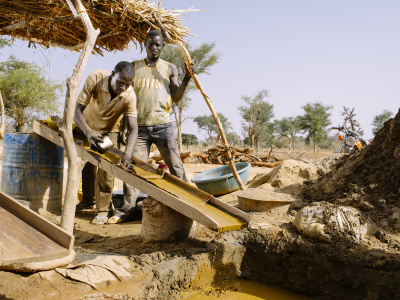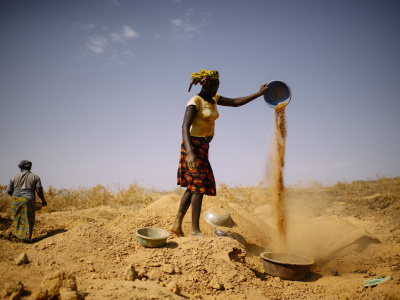
Lack of skilled human capital in resource-rich Africa: The real paradox?
The poor level of skills and institutional development in natural resource management observed in most resource-rich African countries comes not only from the lack of incentives to invest in human capital but also from the perverse effects of the international division of labour.
Most resource-rich African countries lack specialised training institutes of management of their natural wealth. Yet human capital is a key factor for economic growth (Baah-Boateng, 2013) and features as one of the strategic axes of both the African Union Plan of Action for the Acceleration of Industrial Development in Africa (PIDA) and the Agenda 2063.
Even more curious is the yet abundant potential workforce on the continent. Indeed, Africa is home to over a billion people, most of them under the age of 20. With 30% of the world’s known reserves of minerals and a booming population, the undeveloped capacities and continued imported expertise in natural resource management in Africa is unexpected. If capacity is “the ability of people, organizations, and society as a whole to manage their affairs successfully; and capacity development is the process by which people, organizations, and society as a whole unleash, strengthen, create, adapt, and maintain capacity over time” (as defined by ACBF, 2011), and if the lack of skilled human capital contributes to the persistent mismanagement of Africa’s natural resources, resulting in yearly massive financial losses, why have African resource-rich countries not developed local capacities to efficiently manage and exploit their natural endowment? Considering natural resources training schools as an indicator of capacity development, it is argued that the scarcity of such specialised schools persists because the incentives for local skills development are lower than elitists’ interests and because of some perverse effects of the international division of labour.
Low incentives for skills’ development and high elitists interests
Training institutions could create the capacities needed for efficient natural resource management in Africa. However, they compete with both national and foreign interests.
A clash with the interests of national political elites
Natural resources management is a social field (à la Bourdieu) with stakes and interests and whose actors fight to acquire and preserve rare goods and privileges. Since knowledge-capital is the main key to this field (political, economic, technical expertise etc.), its scarcity works to the advantage of the few possessing it: elites.
For instance, in the Central African Republic, former president Bozizé replaced all skilled civil servants with inexperienced members of his Gbaya tribe in the ministry of mines, energy and water resources. In such a context, skills development in natural resource management, by allowing mass training, would put an end to the elitism that prevails in this sector and the subsequent privileges. So, limited investments in human capital seem more profitable not only to national elites but also for foreign stakeholders.
Self preservation-oriented foreign interests and capital
Multinationals and other foreign investors in Africa’s natural resources sector seek to safeguard their interests and, where it applies, their monopolies in negotiation, financing and expertise because it secures and increases their profits. Thus, projects executed by foreign actors are designed in packages that include exploration, execution, operations and knowledge transfer. The latter is more of a final user book transfer and less of a skill transfer because only end-user skills, necessary to operate the product, are transferred. The technological and technical skills required to create the product remain out of reach of the beneficiary countries. By contrast, developing African local skills and expertise, by improving the local supply, would significantly reduce the need foreign ones and arguably the resulting rents.
A perverse effect of the international division of labour
Local natural resource management skills in Africa are limited by the states’ economic extraversion and dependence on primary commodities.
Economic extraversion
Most African countries have not invested in the development of local capacities in resource management because they are not the end users. For instance, on the one hand, Niger is Africa’s first producer of uranium but does not process nor use it domestically. Moreover, 90% of its territory does not have access to electricity. On the other hand, France is the first importer of uranium from Niger, which makes 30% of its total energy consumption. Uranium appears to be a priority for the development of Niger but at the extraction level. Therefore, investments concentrate on extractive operations and exports but not capacity development. As a matter of fact, there are no uranium transformation institutes in Niger. This situation is further reinforced with African economies’ dependence on raw materials exports.
Dependence on primary commodities
African economies’ commodity dependence and the ensuing poor economic diversification do not only impede the growth of their local manufacturing framework. It also impacts heavily and negatively on the continent’s skills development. Indeed, raw materials have little added value. Added value is created by processing and manufacturing locally which in turn requires additional skills, thus training. Furthermore, trained human capital is a more dynamic source of productivity growth.
However, since raw materials exports do not require particular skills, those are not developed. Facts show that most commodity dependent African countries tend to invest less in human capital. “In 2012, natural resources accounted for 77% of total exports and 42% of government revenues” (according to the African Natural Resources Centre) and Africa presents the world’s lowest levels of tertiary enrolment in education. Besides preventing investment in skills development, commodity dependence diverts the existing human capital from other important economic sectors which find themselves depleted or abandoned, a phenomenon also called ‘Dutch disease’. So, natural resources as African economies’ comparative advantage tend to limit one of the very structural drivers they need to spur growth: human resources.
The imperative to invest in human capital
The African economies’ resource paradox actually lies in the lack of qualified human capital and dependence on both foreign markets and expertise. African resource-rich countries tend not to have specialised training institutes from where local expertise could emerge. Among the root causes of this situation is the clash between human capital development in Africa and both national and foreign interests. The incentives for investments in human capital appear to be smaller than the profits of the current key stakeholders. Also, local natural resource management skills in Africa are limited by the states’ economic extraversion and dependence on primary commodities. Because the end product of African natural resources is not consumed in the domestic market but rather a foreign market, investments in skills development are low. In addition, the more commodities-dependent an African economy is, the less it invests in human capital.
Yet, human capital appears to be just as important as natural resources for economic growth of African countries; as the World Economic Forum puts it: “a nation’s human capital endowment–the skills and capacities that reside in people and that are put to productive use–can be a more important determinant of its long term economic success than virtually any other resource. This resource must be invested in and leveraged efficiently in order for it to generate returns–for the individuals involved as well as economy as a whole.”
About the author
Nelly Farah Nguegan is the winner of the 2017 Tana Forum Universities Essay Competition and a PhD candidate at the International Relations Institute of Cameroon.
Read the full magazine issue




